All images courtesy of Salvadore Poe
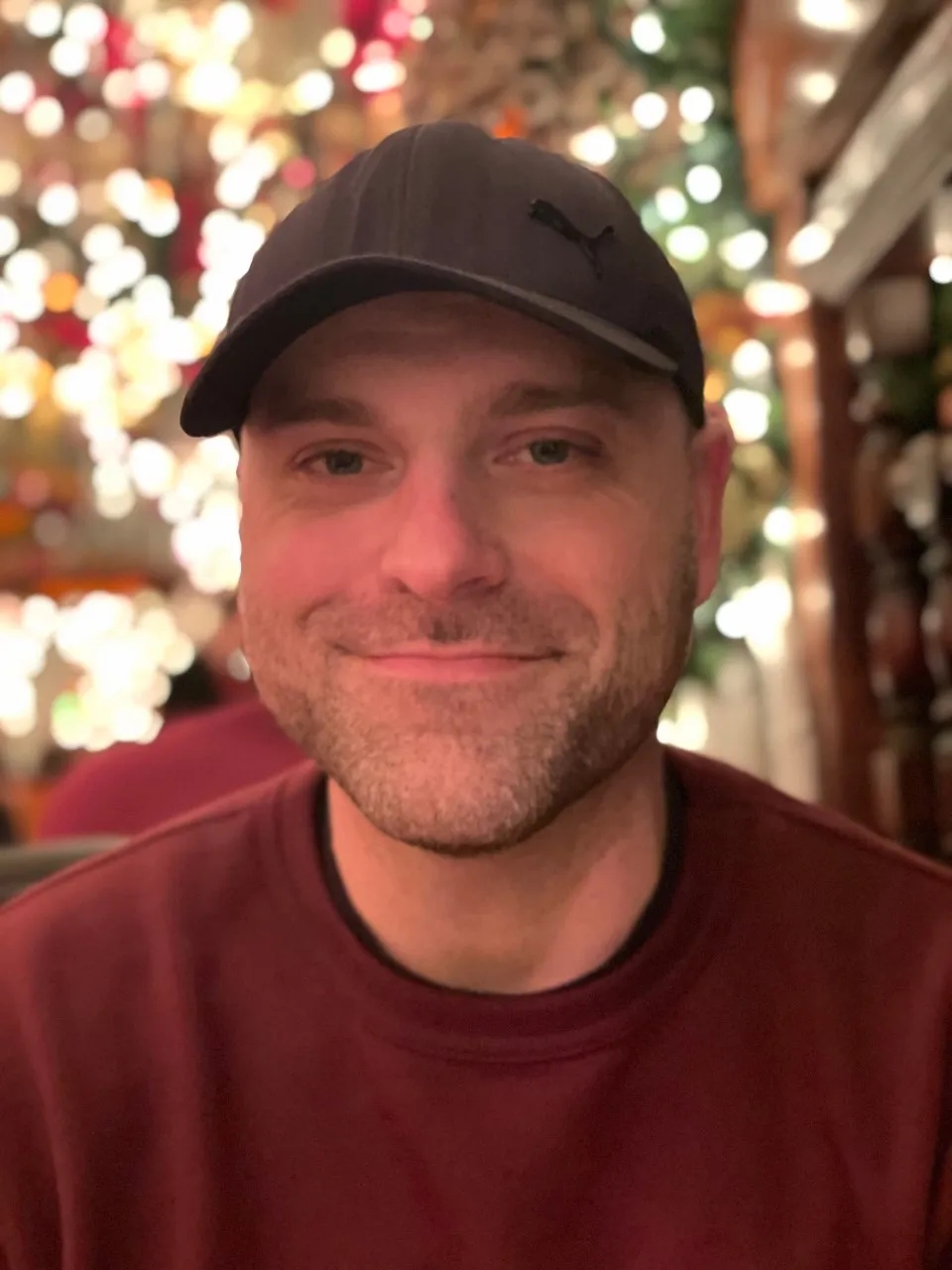
By Andrew Daly
andrew@vinylwriter.com
It’s never been a stretch to liken Salvadore Poe’s guitar stylings to that of a spiritual awakening via music.
In the early ‘90s, Poe (then known as Paul DiBartolo) obliterated stages with Boston-bred band Bang and NYC street metal act Spread Eagle. But for Poe, his dreams have always been ever-shifting, and life has been a moving target in many ways.
In the wake of Spread Eagle’s dissolution, Poe, weighed down by drugs and alcohol, embarked on a life-changing odyssey, learning to let go of the demons, desires, and ideals that once pushed him in a direction aimed at fame and stardom.
Through intensive work, Poe re-evaluated his life, embraced the entity of himself, and let go of all fear and worry over what the future might hold. With this newfound mindset, he turned to music once more, and over the last 15 years, Poe has been quietly making music from his home in India.
Though Poe might have let his guitar do most of the talking in his younger years, in the present day, he has an awful lot to say as an older, wiser, and more fulfilled man. Most of his work harkens back to his earliest influences rooted in ‘60s and ‘70s classic and blues rock, but it’s lyrical themes that steal the show.
After years of predominantly focusing on acoustic work, Poe finds a modified electric guitar in his hands once again. Bookended by his signature tone, Poe’s fluidity and diverse fretwork have not left him. They provide a perfect foil to his plaintive, reflective, and all-too-relatable lyrics about life, love, and rock.
With a new studio, and a cache of equipment hand selected to fit his vision, Poe is finally working on new music and reworking some of his most loved gems from the last 15 years. But the most exciting news may well be that Poe is getting back into the live setting.
“I do play solo acoustic shows here in India,” said Poe. “This is a very recent happening, but I plan to do more. I would love to get out there with a rock band again with my new music, but here it is not really viable. If I lived in the States, I would do that for sure. I don’t think living there again is in the cards, as I love where I am, but hey, ya never know.”
Poe recently set aside some time with me to recount his spiritual journey, the music he’s created in the wake of leaving Spread Eagle, and the effect his outlook on life has had on him as he moves forward and beyond.
Andrew:
Sal, many fans remember you as Paul [DiBartolo] and refuse to let go of that. Does that bother you at all? How would you describe the man you are now vs. the man some fans remember?
Sal:
Hi, Andrew. First, I would like to thank you for your support of me and many other musicians.
It doesn’t bother me at all if people still see me as before. That is how they know me, so that is very understandable. I was a wild and crazy rocker before, striving to succeed and become something. I was not satisfied being ordinary. I wanted more, something special, to be someone. I thought I needed that for some kind of fulfillment. Then when I got on the spiritual path, I was still not satisfied with ordinary life and wanted to have great mystical experiences and enlightenment—still wanting more, something special. I had some of all of those things in both music and in spirituality.
But, eighteen years ago, after a very intensive spiritual search and path (long story), that was all finished. Since then, I no longer need any of that. This ordinary moment, ordinary life, as it is now, is more than enough, already fulfilled. I’m no longer striving to succeed in music, spirituality, or life in general. Life is good as it is.
Andrew:
One of the ideals you live by is that the past is nothing more than a myth. Dig into that for me.
Sal:
I don’t deny that events happened. There was a Spread Eagle, for example. But, it is the belief in and valuing of time, as in, “bad things happened to me in the past,” or, “I miss the good old days,” and “I fear or hope for things that will happen in the future,” which are not actual now, that causes most of our suffering and seeking, both mundane and spiritual. So, I often say that the past and future are a myth and a fantasy – they are not true now. When it is clearly known that, in truth, all there is, is now. And we see the value of knowing that many or all of those things lose their power to cause suffering and seeking because we no longer feel they are important and valuable or have any power over us at all. I call this freedom. It is true for everyone and just needs to be clearly known, understood, and valued. It fundamentally changes one’s experience of themselves and of life. I was happy to hear from you that you clearly got that message from the text I sent you.
Andrew:
How does that affect your music?
In the past, as far as the music that I was exposed to influences how I create music now. I can only create music by what my influences have been. My deepest musical roots are in the ’60s and ’70s. Now, my music is influenced by that. But, lyrically, I am inspired by what I came to know and experience on my spiritual journey. The message of freedom I share with people around the world and the message of my lyrics are the same.
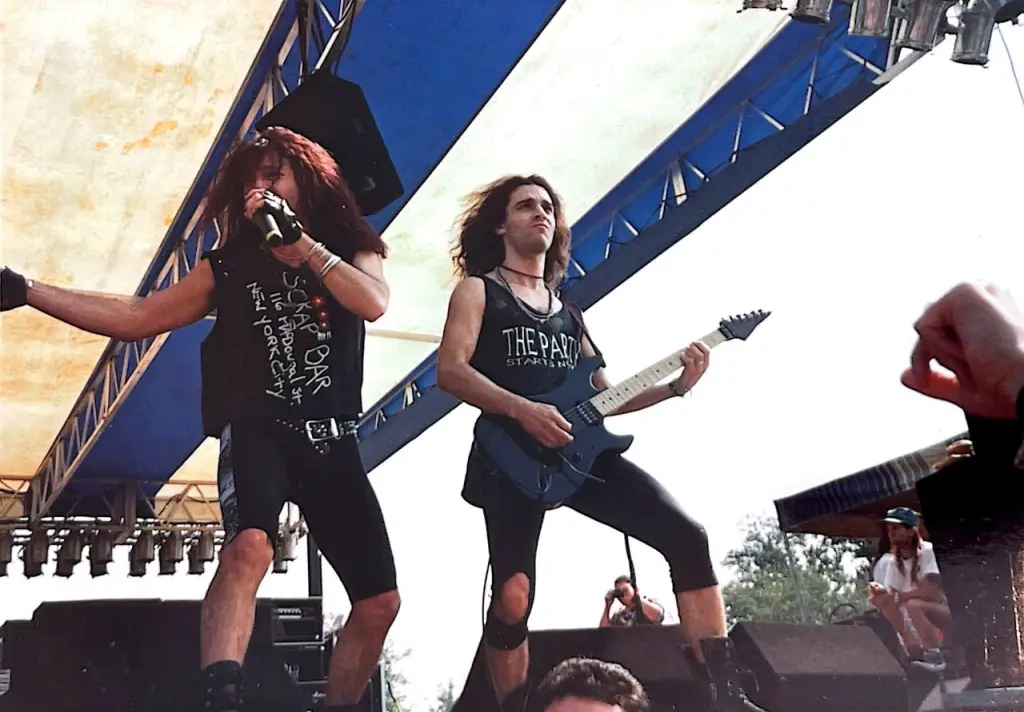
Andrew:
While a lot of people often associate you with heavy metal, that was only a moment in your life, right? You don’t define your journey by that, I assume.
Sal:
To be honest, I really don’t define myself as anything. I am whatever I am now, and that is in constant movement and change. There have been so many periods of my life that look very different from each other. That includes all the different styles of music I have been involved in – blues, rock, acoustic, jazz, metal, and bossa nova. It also includes places I have lived, books I have read, people I have known, and beliefs and concepts I held, all coming and going.
So yes, Spread Eagle and Bang were around eight years of my long life. I respect people who stay with one form of music or lifestyle their whole life, but that is just not how it has been for me. Why? I have no idea. I seem to have many interests in music and other of life’s many offerings, and I don’t feel the need to hold on to any one of them or define myself in any particular way. I like the ephemeral and varied nature of life. I don’t like to be boxed into a single identity. It keeps things interesting.
Andrew:
Take me through the process you undertook from the moment you left Spread Eagle to where you are now.
Sal:
I put everything into Bang and Spread Eagle. Total commitment. That is true with whatever I do. It was an amazing time, for sure. After it was clear that Spread Eagle was finished, which I have spoken about in other interviews, I just moved on. No regrets. I did a film score for The Basketball Diaries, an album with my friend Adam and lots of music for VH1 over the next few years. But I was also doing more and more drugs. It was that which brought me to my knees, literally, and created a crack of light, sending me on my spiritual path.
In that moment, everything stopped, drugs, alcohol, and cigarettes, and I was thrust onto a new life course. I didn’t choose it; it is what happened. It was an equally committed and very intensive eight years of searching for truth, reading books, meditating for thousands of hours, traveling around the world, meeting teachers, and living in India with sages. When that was finished, and since then, music is again a huge part of my life, but in a very different way than before. There is no longer the need to succeed, make it, or be special. There is only the pure love of creating music in the moment. Of course, I like to share the music with people who would like to hear it.
Andrew:
Would you say you’re more comfortable in your own skin than ever?
Sal:
I would say I am content. I don’t need anything except this moment. And it seems I do many things – write and record music, write books, teaching work, and intensives. I even designed and oversaw the construction of the house my partner Bindu, and I just moved into here in India, a two-year project. But none of that comes from any psychological need to get somewhere or be someone. I just put one foot in front of the other and do whatever appears to me in the moment. If an idea comes (from where I have no idea), I act or not. I don’t really think if I can do something or not; I just go for it. And yes, my music definitely reflects that way of being.
Andrew:
As I understand it, you’re building a studio. Is that right?
Sal:
All of the music I have done here in India since 2006 has been done in my very simple home bedroom studios. I have not even had a guitar amp in all those years. Now, at our new home, I built an extra building as a studio. We are currently doing the acoustic panels and construction of the desk, etc. I had my Tungsten Crema Wheat amp sent from the USA and bought a lot of new guitars, a bass, and other gear; mics, preamps, etc. I am looking forward to getting into recording my new music.
Andrew:
Your latest music isn’t metal, but it does seem to be more rock-oriented. What led you down that path once more?
Sal:
Yes, it is more my root, heart music, inspired by the music I love the most; The Beatles, Dylan, Neil Young, Hendrix, Cream, and The Band, to name a few, and all that other great music of that era. Of course, I don’t really sound like any of them, but it is the raw, alive, deep heart, the looseness, and freedom of that music I love.
Andrew:
The first track I want to dig into is “Let it Rain.” Can you recount its origins?
Sal:
That song came about a year after my path was finished, in 2005. I was living in a beautiful place in India, spending all my time making music, going to Goa and Thailand, and enjoying life. I don’t remember the moment that one came, but it was one of many that were coming then.
Andrew:
How about “Unchain Your Heart?” What was your approach?
Sal:
That’s a more recent song. Sometimes I pick up my guitar, and a chord pattern or riff or something comes. Sometimes that brings a melody, and sometimes that leads to a whole song with lyrics. And sometimes not. I really don’t feel that I write them. They are born when they are born. Once they come, it’s like they have always been here; they just needed to be “unearthed,” so to speak. They have their own life. Songs always come very quickly. Usually, in less than an hour, from the original idea to the lyrics. I don’t like to labor over the things I do. Creation has its own flow, and “Unchain Your Heart” came in minutes. It is, like all my songs, based on my life view.
Andrew:
“Weightless” and “Keeps You Comin’ Home” are fantastic as well. Can you break them down?
Sal:
“Weightless” was an early song from 2006. It reflected my state of mind then and now as well. As for “Keeps You Coming Home,” that came a few years ago. It again reflects how I see life and myself. The lyrics of all my songs speak for themselves, so I don’t really need to explain. All of my songs are about me, really. Even if they are not first person, they are from my experience and view of life now. But I feel they apply to everyone.
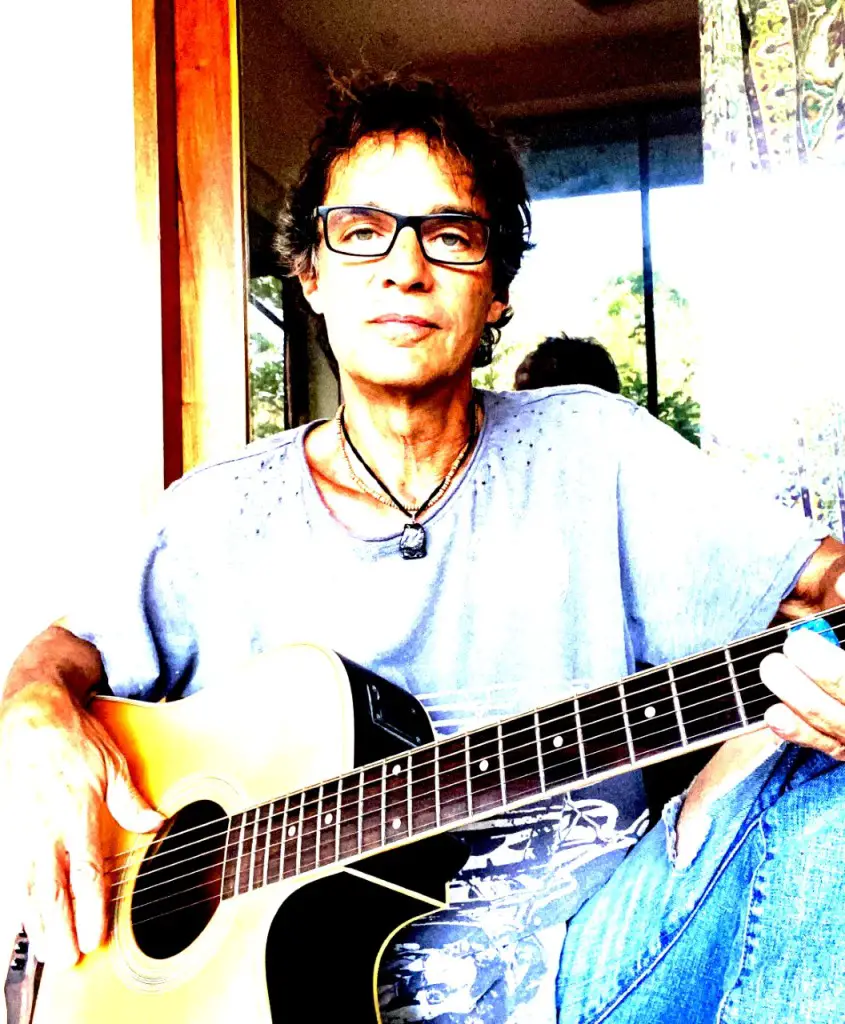
Andrew:
Is there a new record in the works?
Sal:
I have at least a dozen brand-new songs to record. I just bought a mandolin, and as I was learning some chords, a new song came. I also plan to re-record some of the older ones, some that you mentioned already. I have some friends here that play tabla, djembe, harmonium, and wood flute. I might add some of those colors in a few tracks. But mostly, it will still be guitar, bass, and drums. There will be more electric guitar than in a lot of my previous music and more guitar solos as well.
Andrew:
Does it have a title and running theme? Any idea of a release date?
Sal:
The theme is rock ‘n’ roll, freedom, and love. Not sure about a title yet. The release date is a whole other question. The way to get music out these days is different than when I was in Spread Eagle, so I don’t yet know if I will release one song at a time or the entire album at one time. I need to look into that and maybe get some advice. I do plan to make some videos as well.
Andrew:
When you look back on some of your grittier experiences with drugs and alcohol coupled with life on the road with Spread Eagle, does any of that factor into your lyrical approach in terms of storytelling?
Sal:
Yes, it all factors in. All of the events of my life, and everyone’s life, are formative to who we are. I can only sing about what I know. Before my spiritual path ended, I wrote very few lyrics, except for the bossa nova album I composed when I lived in Sweden and a few lyrics with Spread Eagle. But I never felt I had anything of value to say, so I just shut up and played my guitar. Now, I have something I feel is valuable to share, so my lyrics arise from that. And that has everything to do with all of my life experiences.
Andrew:
Do you harbor any regrets from those days, or wish you had done anything differently?
Sal:
No way. My life, and everyone’s life, cannot be any different than it is or was. I am very grateful, in fact, for all of the things, good and bad, that happened. I never feel that anything is wrong with anything. I say, if it happens, it must be right. Something might look bad from the outside, but it is often that exact thing that creates a positive change or a crack of light for something new to emerge. This is what “Keeps You Comin’ Home” is about, actually. As far as a grand plan, I really don’t know about that. All I know is what is now. Where it came from, why it is here, where it is going, and all of that, I have no idea or need to know. I just live life as it is now.
Andrew:
You’ve got a lot of stories inside you, Sal. Would you ever publish another book?
Sal:
I have three books already on Amazon and have written two more in the last couple of years. The one I sent you is one of the new ones – A Crack Where the Light Comes In. It’s an autobiography. I have not yet decided if I will publish it; still mulling that over.
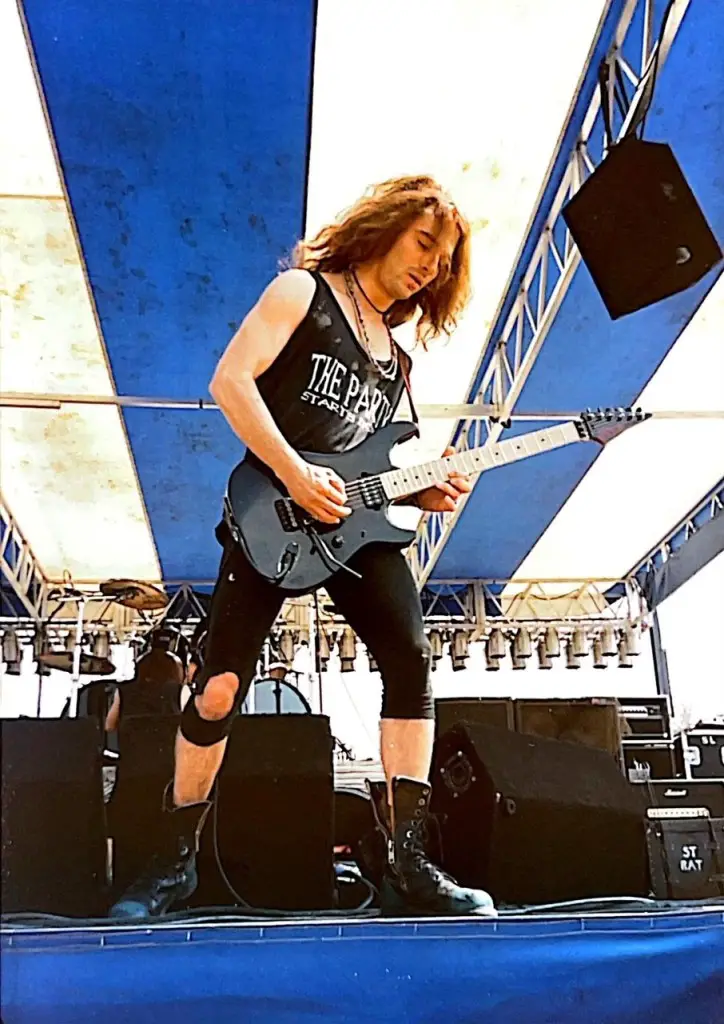
Andrew:
If you had to boil down your present-day approach to the guitar, how would you do it?
Sal:
The guitar is the main musical tool I am able to use that can express what I want to express. I no longer want to blow people away with my chops, but to move them in a deeper way, to feel something. It is all about my heart and feel for me. It was the same back in the Spread Eagle days, the feeling was still there, but I also wanted to show my skill, be impressive, and kick some ass. That no longer interests me. My guitar roots are blues -Hendrix, Johnny Winter, and Duane Allman. So, that feeling is what I like to express. If a solo doesn’t have that heart, it doesn’t move me. I will say, though, that I am quite blown away by some of the technically incredible guitar players out there these days. I love to see it. It often cracks me up when I see how great they play. They can play circles around me.
Andrew:
When I listen to your solo work, I still hear that signature tone and fluidity from your early days. It hasn’t left you.
Sal:
I guess not. Tone has always been huge for me. I have had to deal with a limited ability with tone over the last many years because I have been using virtual amps. But that is finished now, and I can’t wait to wrench out truly delicious guitar tones with my new setup. I like to feel the tone in my throat, my chest, and my belly. I like to hear the tubes, speakers, wood of the cabinet, wood of the guitar, strings, fingers, all of it. I want a guitar to sound like a great violin or cello. But, of course, the style and fluidity of the playing come from the player, so that has still been there.
Andrew:
What gear are you using these days and why? Do you still have any of the gear or equipment from your younger days?
Sal:
I have sold so many pieces of great gear over the years. So, no, I don’t have any of that. Now, I have my Tungsten Amp, which is a boutique version of a ’57 Fender Tweed; sounds amazing. I just bought an Epiphone Casino; I fully modified it. A new Fender Ultra Strat. A Tulsi Les Paul, made by an Indian luthier here. A Logan Tele, which is excellent. A Martin acoustic. And I just bought an Epiphone EB-3 bass, similar to what Jack Bruce used in Cream. I bought a Fender Bassbreaker Amp for my bass sounds. I also just bought an electronic drum kit, so I can actually play the drums instead of playing them on my Midi Keyboard with my fingers, as I have been doing for years. I have some amazing Eddie Kramer classic drum samples to trigger with the drum kit, can’t wait! All of the gear I have is to get the sound I hear in my head – raw, warm, grungy, beautiful, and delicious.
Andrew:
If I asked you to lay down the solos for “Switchblade Serenade” or “Revolution Maker” right now, could you do it?
Sal:
I’d have to re-learn them from the recordings and then practice them! [Laughs]. But if forced to, I could do it. I’d break a sweat doing it, for sure. It’s been thirty years since I played any of that. It’s funny; I rarely listen to old music of mine, but sometimes Rob [De Luca] posts a Spread Eagle song, and I listen, and I’m like… damn!!! Perhaps my favorite solo is on “Devil’s Road.”
Andrew:
What are the five albums that most shaped your musical life, and why?
Sal:
Good question. Though, I’ll have to give you more than five. I’d say: Hendrix, Are You Experienced, and others, Johnny Winter and, Live, The Beatles, White Album, and others Dylan, Blonde on Blonde, and others, Allman Brothers, Live at Fillmore East; Crosby, Stills, and Nash, debut album. C.S.N.Y., Deja Vu, James Taylor, Sweet Baby James, Cream, Disraeli Gears, and others. The Band, Music from Big Pink, Pat Metheny, Bright Size Life, Van Halen, first album, and others.
There are a lot more, but those stick out at this moment. To me, and this is, of course, only my opinion, those are some of the most beautiful, real, genuine rock albums. They are all full of amazing songs, playing, singing, sounds, and performances. What I like about that music is that is so real; it is not perfected and sterilized; it is alive. Real performances, very human with super talent. There are no click tracks and no autotune.
Andrew:
What’s something you live by now that you wish you had known 30 years ago? And if you had known it, how might your life be different?
Sal:
I live by freedom and love. That’s what I feel is most important. I don’t wish life to have been any different than it was and is. It has all been exactly how it has been, and it is all part of me now. This is, of course, true for all of us. Rock on!
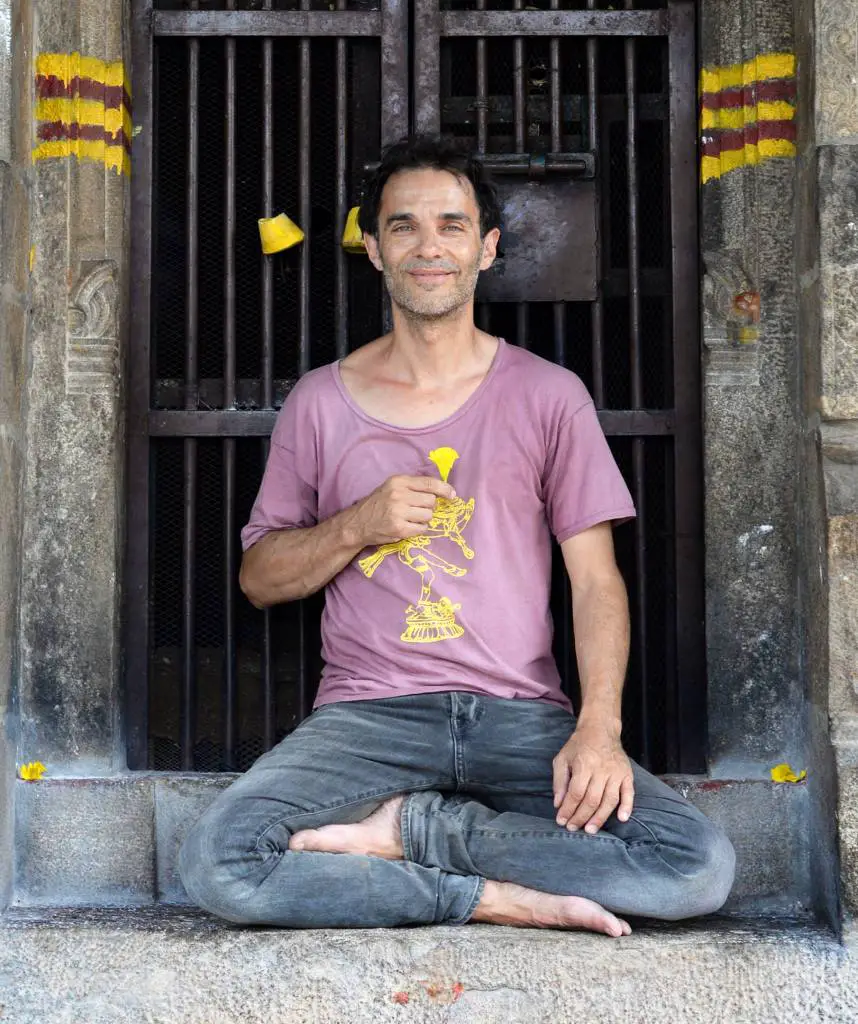
– Andrew Daly (@vwmusicrocks) is the Editor-in-Chief for www.vwmusicrocks.com and may be reached at andrew@vinylwriter.com





Leave a Reply